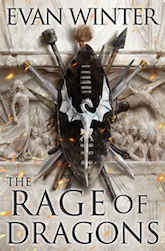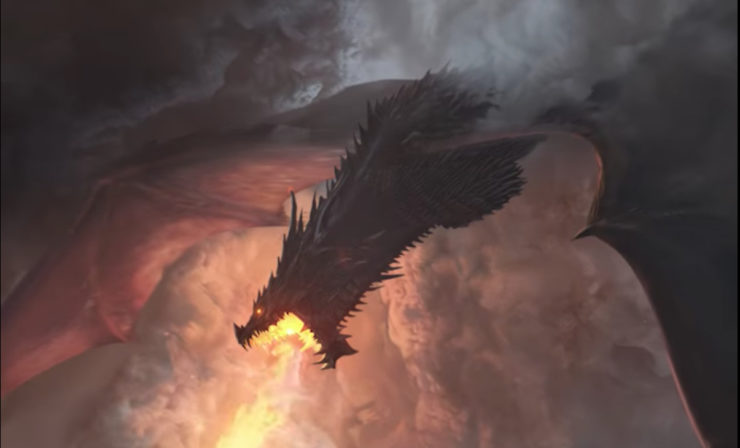To celebrate his debut novel, The Rage of Dragons, author Evan Winter dropped by r/fantasy for an AMA. Described as “Game of Thrones meets Gladiator,” and inspired by the Xhosa culture, The Rage of Dragons began as a self-published book before it was picked up by Orbit, later soaring to a #1 best-seller spot on Amazon. In his AMA, Winter breaks down how this came to be, as well as his influences, process, inspirations, author recommendations, and more. Check out the highlights below!
On his journey from self-publication to Orbit:
There were fewer steps than I expected and each step took longer than I thought it would :)
I was self-publishing the book on Amazon (using Amazon KDP) and it’s a success;
I announced it here, because I’d been visiting r/Fantasy for years and years (I’m a dedicated lurker);
r/Fantasy pushed the book into the top 250 of all books selling on Amazon that day;
r/Fantasy‘s initial push kept the book going for quite some time and I realized that what was going to be a bucket list item and hobby could actually become something more;
I ran some numbers to make sure I was right, delayed getting a ‘real’ job, and planned to self-publish the rest of the series;
I got a message from a senior editor at Orbit asking if we could speak (she lurks Reddit too and saw the book here);
We got on the phone and talked fantasy and books and my book and it was a wonderful conversation (I was really nervous though);
The editor got back in touch to say that Orbit was going to make an offer and that I should get an agent;
I was fortunate enough to sign with two agents from William Morris Endeavor (Literary and Film/TV);
We made a deal to publish the series (4 books) with Orbit;
My editor provided notes for some changes to the book;
I was anxious about this and worried that I’d put myself right back in the position I’d been in as a director (where notes come in and you basically must follow them and many times they can change your intent and, being a gun-for-hire, you just have to suck it up and make the changes);
The notes were really, really good and every single one (no exaggeration) was something that I could see would make the story stronger;
I’ve also realized that the notes are not directives in the same way that they tend to be in the film world. The book is still my world and the notes are there to help that world be better, not to change it;
I made only the changes I agreed with (all of them) and handed in the book;
In the meantime, Orbit began work with a brilliant cover artist: the awesome Karla Ortiz;
They began work with the incredible audiobook narrator: Prentice Onayemi; and
Once all that work was done, books were printed and shipped to stores in preparation for… today. :)
Buy the Book


The Rage of Dragons
On why he chose to self-publish:
I chose to self-publish because I’d worked in creative industries for my entire adult life and the work I did was always subject to the needs and goals of others. That’s fine, it’s what I was paid for but, before I died, I really just wanted to make something entirely for me. I wanted at least one piece of work out in the world that existed as I had hoped it would and I was afraid that traditional publishing, if they’d even pay attention to me, which I thought was unlikely, would request too many changes and try to make my story into their story as well. So, to avoid all that, I self-published.
I should say that my expectations of traditional publishing have not matched my current experiences. I’m only one person and I’ve only published one book, but Orbit, and my editor there, have not, in any way, tried to change my story or make it ‘ours’.
Instead, it’s felt as if they’re supporting the story I want to tell and trying to do everything they can to help me do the best job of telling it.
On the physical setting of The Rage of Dragons:
The Rage of Dragons takes place in a secondary world analogous to the continent of Africa. It does not hold tightly to any real world culture, army, or history, though, if it can be said to take influence from an African culture, the primary one would be the Xhosa.
I do not take African Gods, Goddesses or mythology into my world in the same way that GRRM doesn’t do this in GoT, Tolkien doesn’t do this in LoTR, and Herbert doesn’t do this in Dune. I’m not comparing myself to these brilliant writers, but simply saying that, though my world is analogous to Africa, it is not Africa and the people in the world, though analogous to Africans are not Africans, just as Westerosi are not Europeans.
A lot of the time, writers who write settings outside of the West are suddenly tasked with providing almost a historical accuracy to their fantastic tales in a way that is not asked of the stories in the more Western tradition. It was important to me to reject this boxing in of what I could do.
I wanted a secondary world because that’s what I loved reading when I read authors like the ones listed above. But, I also wanted a secondary world centering people who look like me and my family. The Rage of Dragons is Epic Fantasy and not historical fiction. I try hard to present a narrative that rings true, but it is not a narrative from our Earth.
On why he chose to set the series earlier than typical fantasy novels:
The story does take place closer to the bronze-age than the middle-ages because it didn’t want to be encumbered by even the limited technology that was available in the middle-ages. It wanted to be very much about people in their environment dealing with conflict and having the environment be relatively unconquered and uncontrolled. The time period also makes the whole world have the more immediate and claustrophobic feel of a knife-fight vs. a gun-fight (if that makes sense) and the more I explored that, the more excited I became about telling that story.
On advice for aspiring writers, and how his background in film and TV influences his process:
I’m a heavy plotter and, before I began a draft, I have a master outline that lists and then breaks down every scene in the book into beats. This means that my outlines, so far, have been about 20% the length of the final manuscript. I think I do this because, before writing, I was a film and music video director. In film, we tend to plan everything out in advance of shooting because being on set and shooting is so expensive.
I also find that a thorough outline helps me avoid what I think is the most common pitfall that prevents newer writers from completing a draft. The story I always hear is that a writer made it to the middle of the book, got stuck, blocked, or lost, and then felt the idea for the book wasn’t good enough, so the manuscript is abandoned in favor of a newer idea. The outline makes the middle part less scary, and helps me get through that tricky part of the book. I still feel like the work is harder in the middle (must be human nature or something) but I trust the plan and that gives me the drive to get to the end.
For advice, I’m new enough to worry about giving any, but the one thing I’d encourage brand new writers to do is to finish what you start. Don’t compare the opening acts of your first draft to the published works of the greats. Finish your draft and revise and you’ll get to where you need to be.
On books you may like if you enjoyed The Rage of Dragons:
[Here’s] a shortlist of top-of-mind books in the same vein as RAGE that I read and enjoyed prior to writing it: The Warded Man, Blood Song, Red Rising, Legend, The Dark Elf trilogy, The Heroes, and many others that escape me at moment.
On what would piss him off the most if he were a dragon:
The hubris, greed, cruelty, and exaltation of ignorance that can be seen in pockets of humanity. There are few other creatures willing and able to do so much harm to one another and humans may be the only ones capable of so much good. Knowing both those things would frustrate me because I would want so much more from them.
On his protagonist, Tau:
Tau was very difficult to deal with. Some people find him frustrating and do have issues rooting for him. I know him and people like him. They are talented, emotional, and when obsession becomes mixed with their talent and emotion, they have little room for anything else. They can be brilliant forces of change that wreak havoc in their wake. Those types of people intrigue me. Tau intrigues me. He’s also a bit of an ass.
[…]
I’m fascinated by obsession in all its forms and think that it’s a double-edged sword for most who do have an obsession while also believing that it’s often necessary if one is to excel in very competitive environment. It’s a damaging trait with benefits, and I find that intersection and the conflict that takes place there to be endlessly interesting.
And lastly, on what all those dragons are raging about:
The thing is… the answer to that is actually a spoiler. :)
The Rage of Dragons is out now, and you can read the opening chapters online. According to the author himself, book 2 will be released in Summer 2020, with books 3 and 4 following in Summer 2021 and Summer 2022, respectively. Check out the rest of Evan Winter’s AMA here.











That is a good account of traditional publishing where the author feel supported, quite a gem. Thanks for the report.